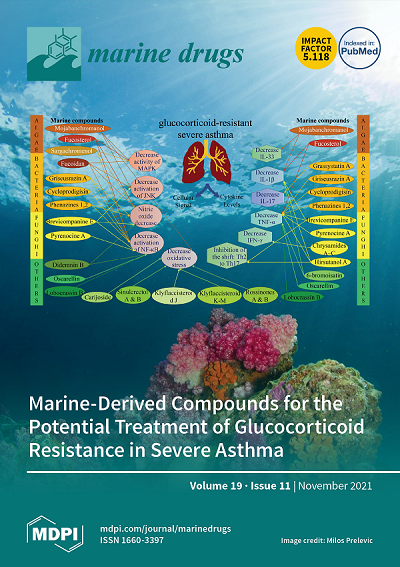发酵鱼胶原蛋白通过降低紫外线诱导的氧化应激抑制黑色素生成
IF 4.9
2区 医学
Q1 CHEMISTRY, MEDICINAL
引用次数: 0
摘要
过度的黑色素生成会导致与色素沉着相关的美容问题。紫外线照射会增加氧化应激,从而促进与黑色素生成相关的信号通路,如 PKA、小眼球相关转录因子(MITF)、酪氨酸酶(TYR)、酪氨酸酶相关蛋白-1(TRP1)和酪氨酸酶相关蛋白-2(TRP2)通路。甘氨酸是包括谷胱甘肽在内的内源性抗氧化剂的来源。发酵鱼胶原蛋白(FC)中含有甘氨酸;因此,我们评估了 FC 通过降低氧化应激减少黑色素生成的效果。经紫外线照射的角质细胞中,甘氨酸受体(GlyR)和甘氨酸转运体-1(GlyT1)的水平有所下降;但在使用 FC 处理后,这些蛋白的表达水平有所上升。FC能降低氧化应激,表现在紫外线照射后的角朊细胞中NOX1/2/4表达量减少、GSH/GSSG表达量增加、SOD活性增加以及8-OHdG表达量减少。向黑色素细胞施用经 FC 处理的角质形成细胞的条件培养基会导致 p38、PKC、MITF、TRP1 和 TRP2 的表达减少。在经紫外线照射的动物皮肤上也观察到了 FC 诱导的这些变化。FC 处理增加了 GlyR 和 GlyT 的表达,同时降低了紫外线照射皮肤的氧化应激。此外,FC 还能负向调节黑色素生成信号通路,从而降低紫外线照射后皮肤中黑色素的含量。总之,FC 能降低紫外线诱导的氧化应激,减少黑色素细胞和动物皮肤的黑色素生成。FC可用于治疗紫外线引起的色素沉着问题。本文章由计算机程序翻译,如有差异,请以英文原文为准。
Fermented Fish Collagen Attenuates Melanogenesis via Decreasing UV-Induced Oxidative Stress
Excessive melanogenesis leads to hyperpigmentation-related cosmetic problems. UV exposure increases oxidative stress, which promotes melanogenesis-related signal pathways such as the PKA, microphthalmia-associated transcription factor (MITF), tyrosinase (TYR), tyrosinase-related protein-1 (TRP1), and tyrosinase-related protein-2 (TRP2) pathways. Glycine is a source of endogenous antioxidants, including glutathione. Fermented fish collagen (FC) contains glycine; thus, we evaluated the effect of FC on decreasing melanogenesis via decreasing oxidative stress. The glycine receptor (GlyR) and glycine transporter-1 (GlyT1) levels were decreased in UV-irradiated keratinocytes; however, the expression levels of these proteins increased upon treatment with FC. The FC decreased oxidative stress, as indicated by the decreasing expression of NOX1/2/4, increased expression of GSH/GSSG, increased SOD activity, and decreased 8-OHdG expression in UV-irradiated keratinocytes. Administration of conditioned media from FC-treated keratinocytes to melanocytes led to decreased p38, PKC, MITF, TRP1, and TRP2 expression. These changes induced by the FC were also observed in UV-irradiated animal skin. FC treatment increased the expression of GlyR and GlyT, which was accompanied by decreased oxidative stress in the UV-irradiated skin. Moreover, the FC negatively regulated the melanogenesis signaling pathways, leading to decreased melanin content in the UV-irradiated skin. In conclusion, FC decreased UV-induced oxidative stress and melanogenesis in melanocytes and animal skin. FC could be used in the treatment of UV-induced hyperpigmentation problems.
求助全文
通过发布文献求助,成功后即可免费获取论文全文。
去求助
来源期刊

Marine Drugs
医学-医药化学
CiteScore
9.60
自引率
14.80%
发文量
671
审稿时长
1 months
期刊介绍:
Marine Drugs (ISSN 1660-3397) publishes reviews, regular research papers and short notes on the research, development and production of drugs from the sea. Our aim is to encourage scientists to publish their experimental and theoretical research in as much detail as possible, particularly synthetic procedures and characterization information for bioactive compounds. There is no restriction on the length of the experimental section.
 求助内容:
求助内容: 应助结果提醒方式:
应助结果提醒方式:


